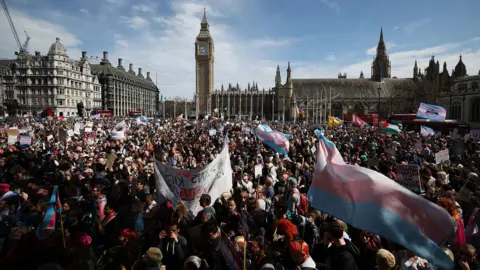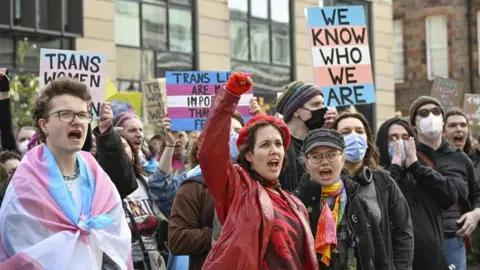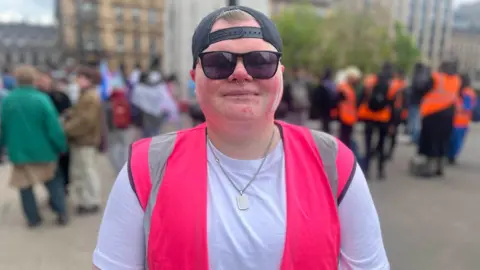Trans people will feel anxious over gender ruling - Swinney
Scotland's First Minister John Swinney has said the Supreme Court ruling over the legal meaning of a woman will leave members of the trans community feeling "uncertain and anxious".
He was speaking as protests were held in London, Glasgow and Edinburgh against the ruling that biological sex defines a woman for the purposes of the Equality Act.
Swinney declined to directly answer whether he believed a trans woman is a woman, but said he accepted the court's judgement.
He said the Scottish government would set out on Tuesday the steps it will take to comply with the law.
The Supreme Court ruling on Wednesday has major implications for single-sex spaces and services such as public toilets and changing rooms.
This means transgender women with a gender recognition certificate can be excluded from single-sex spaces if "proportionate".
The case had been brought by the group For Women Scotland who claimed that sex-based protections should only apply to people who are born female.
The Scottish government argued in court that transgender people with a gender recognition certificate (GRC) are entitled to the same sex-based protections as biological women.
The judges unanimously ruled that the terms woman and sex in the 2010 Equality Act "refer to a biological woman and biological sex" rather than "certificated sex".
 EPA
EPALarge demonstrations took place in Glasgow's George Square and at the foot of the Mound in Edinburgh on Saturday to protest against the judgement.
Thousands more marched through central London for what was billed as an "emergency demonstration" which started in Parliament Square before heading towards St James's Park.
Activists demanded "trans liberation" and "trans rights now", with some waving flags and holding banners which read "No feminism without trans women" and "Biology is not binary".
 PA Media
PA MediaJohn Swinney told BBC Scotland News his government would "accept and adjust to the circumstances".
He said: "The first thing that is important is that we all have to accept the rule of law so I accept the Supreme Court decision because it is the voice of the most significant court in the land.
"We will focus entirely on making sure the rights of absolutely everybody are protected at a time when, I acknowledge that there will be many in the trans community that feel very uncertain and anxious about the implications of the Supreme Court ruling."
Swinney said courts in Scotland had twice supported the Scottish government position and his government had always acted in "good faith" but added that the Supreme Court had provided legal certainty.

One of those who attended the demonstration in Glasgow was Alexander Cart, a trans man who described being "completely devastated" by the ruling.
Alex told BBC Scotland News: "I already struggle to go into to single sex spaces because I look too feminine for one and too masculine for the other but now I feel like I'm really being forced into a corner of you have to go into the ladies restroom.
"I'm terrified for the future, I don't know whether my care is going to get worse tomorrow or if it's going to get better.
"We are being told we can't be who we want to be and most of us are adults, surely it should be our choice to choose what we want and who we are."
'Completely wrong'
Trans people will continue to have protections under the Equality Act because gender reassignment is listed as a protected characteristic.
The Equality and Human Rights Commission - which oversees the application of the Equality Act - is to issue new guidance to help service providers.
The watchdog's head, Baroness Falkner, has suggested trans people should use their "power of advocacy" to ask for facilities including a "third space" for toilets.
Susan Smith, co-director of For Women Scotland, the group which brought the case to the Supreme Court, has called for the Scottish government to apologise to women.
She told BBC Scotland News: "I think we'd be asking for an apology, not a personal apology from Mr Swinney, but from the Scottish government for the way they've approached this, the way they have handled this, the way they have treated women campaigners.
"There needs to be an acceptance on the part of the Scottish government that much of what they did, much of what they allowed ministers or members of committees to do and say and act was completely wrong."
She added that the ruling would have "huge implications" across the public sector in Scotland, including in schools, prisons and hospitals.
She said For Women Scotland should be a part of discussions moving forward.
